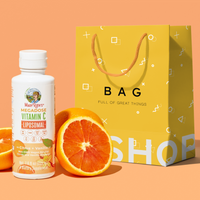
FEATURED
BY COLLECTION
FIND MARYRUTH'S IN STORE!

STORE LOCATOR
Now you can find your all-time faves and discover some exciting new products while you're out shopping.
GET STARTEDCollagen is often hailed as the foundation of smooth skin, strong hair, and flexible joints.
As the most abundant protein in the human body, collagen provides structure to bones and is a major component of skin and connective tissue, including tendons and ligaments. However, traditional collagen supplements are derived from animal sources, leaving those who follow more vegan or plant-based lifestyles seeking effective alternatives.
So, can you get collagen from plants?
The short answer is no, but that doesn’t mean there aren’t vegan-friendly ways to support collagen production naturally!
As mentioned above, collagen is a structural protein found in the skin, bones, cartilage, tendons, and ligaments. You can almost compare it to a type of glue that holds our bodies together!
But collagen production declines as we age — typically starting in our mid 20’s.
External factors, such as excess UV exposure, poor nutrition, and smoking, can also contribute to further collagen loss. This decline in collagen can lead to visible signs of aging and weaker joints.
Many people are turning to collagen supplements to help this decline in collagen, however, most traditional collagen supplements are derived from bovine (cow), porcine (pig), or marine (fish) sources.
If you’re looking for an alternative to traditional collagen, there are vegan collagen options—solutions designed to naturally support and boost the body’s own collagen production.
As an animal-derived protein, vegan collagen does not naturally exist in plants. That’s why many traditional collagen products are sourced from animal tissues or marine collagen derived from fish scales and skin.
So, what does this mean?
Even though plants don’t contain collagen, there are many that do contain essential nutrients that help stimulate the body’s natural collagen production process.
While you can’t directly consume vegan collagen, you can give your body nutrients it needs to make more of its own!
With some healthy foods, habits, and supplements, you can support your body’s ability to produce collagen effectively.
You can naturally incorporate foods into your diet that contain the vitamins, minerals, and amino acids that help support collagen production. Here are a few vegan-friendly options:
Water supports skin elasticity and prevents dryness, which can damage collagen fibers. It’s important to stay hydrated and drink plenty of water each day!
Quality sleep is important for overall health, and sleep can help the process of tissue repair and collagen synthesis.
Supplements containing vitamin C, amino acids, and antioxidants can also help to provide your body with the resources it needs to support collagen production.
Rather than taking external collagen supplements, MaryRuth’s offers collagen-boosting products that support your body with nutrients it needs for its own collagen production:
With a commitment to clean ingredients, our vegan collagen-boosting supplements are non-GMO, vegan, gluten-free, third-party tested, and Clean Label Project Certified.
While collagen itself isn’t vegan, supporting your body’s natural collagen production is entirely possible with the right nutrition, lifestyle habits, and high-quality supplements!
Health education made simple
your shopping bag